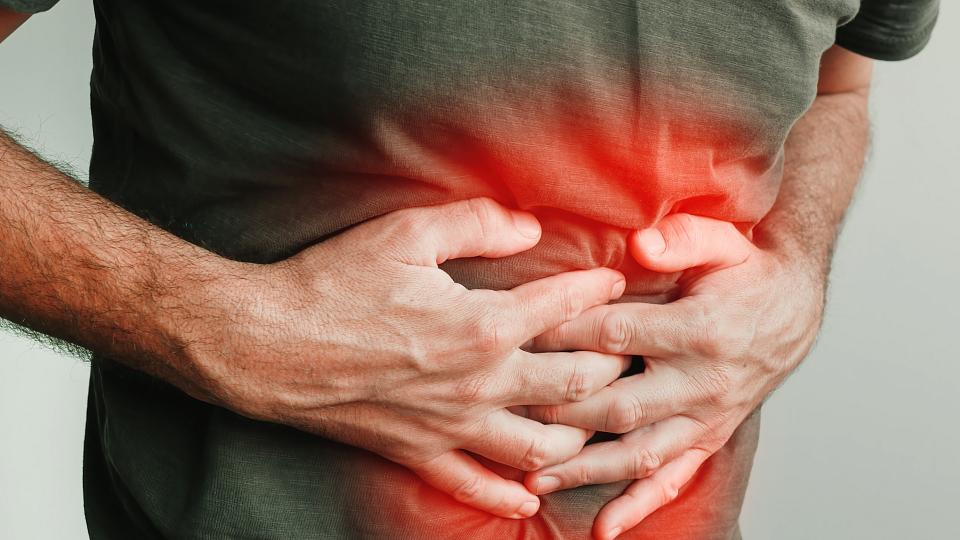
Interviewer: You have chest pain, but you don't think it's probably a heart issue, what could that be? Well, we're going to examine that next on The Scope.
Announcer: This is "From the Frontlines with Emergency Room Physician Dr. Troy Madsen" on The Scope.
Chest Pain on the Left Side
Interviewer: Dr. Troy Madsen is an emergency room physician at University of Utah Health, and Dr. Madsen, sometimes I get this thing on my left side of my chest. I don't think it ever happens on the right, but it feels like there's a lot of pressure in there. It feels like a bubble, like an air bubble maybe. It's difficult for me to take a deep breath. And it'll either just go away, or if I can take a deep enough breath, it feels like it pops. What could that possibly be? I hope I haven't been having heart attacks this whole time.
Do You Have Risk Factors for Heart Disease or Blood Clots?
Dr. Madsen: I hope you haven't. This is a very common question I get in the ER, and I may see over the course of the shift maybe even a couple of people, like yourself, who have this exact same question. So in my mind, of course, I'm thinking, "Okay. I've got to make sure it's nothing serious." So I would ask you about, do you have any risk factors for heart disease, any risk factors for blood clots in your lungs? So those are number one and two I'm thinking about. Have you had any recent surgery or anytime you just haven't been moving a lot where you could have formed a clot that went to your lungs?
Acid Reflux (GERD)
But what you're describing doesn't sound much like either of those things. I might do some basic tests to make sure things are okay there. But once we rule out the more serious things, and I start to think about other things that often cause chest pain. And probably one of the most common things is acid reflux. People get acid reflux, acid that's working it's way up from the stomach through the esophagus into that food tube that runs down your chest, and that can oftentimes cause a feeling like maybe a bubble in your chest. Most people describe it as a burning sensation there, maybe a bitter taste in the back of their mouth.
Another thing we see often is something called costochondritis. And that's an inflammation in the cartilage where the ribs come and they meet the sternum. So the breast bone there, where they come together there, that that can get inflamed either from sometimes a viral infection, or just from maybe overuse, or maybe even you've been twisting wrong, and that causes some inflammation that can cause some pain.
Sometimes, you can get what we call pleuritis, where you get inflammation along the lining of the lungs. And that can cause, again, some chest pain in there that sometimes worse when you take a deep breath. But with your symptoms, if I had to say it's anything, I would lean more toward maybe some reflux, that feeling like a bubble in there.
Interviewer: I was thinking that's about as close, but it's not in the center. It's always off to the side, like up in this area. And it tends to be pretty consistent to where it will develop when it develops.
Dr. Madsen: Yeah interesting.
Interviewer: And it freaks my wife out a little bit when I'm like, "Oh, oh." And I try to take that deep breath and I can't, because there's that catch or something there.
Dr. Madsen: And sometimes you can, in your back, you can have some muscle spasm. You've got muscles between your ribs. Sometimes you could get maybe some muscles spasm or some inflammation between the ribs. That could cause, possibly, something that comes and goes like that, especially where it's worse when you take a deep breath. The reality with chest pain is, I tell patients, "Hey, once we've ruled out the bad stuff, it could be any of a number of things. It could be reflux. It could be the costochondritis. It could be some muscle thing, some inflammation there.
There's not a lot I'm going to do differently for these things. Maybe try some acid medications, some stomach medication for the reflux. Try some ibuprofen for some of these other things. And so I wouldn't worry about it. I don't want to tell you that now, I know you are going to have a heart attack just [Inaudible 00:03:36]
Interviewer: Well, I was going to say, this could point probably at this point two things. One, I'm going to pay attention next time and see maybe if I feel that it is acid reflux. Because sometimes just realizing what it could be makes you visualize it differently.
Dr. Madsen: Exactly.
Interviewer: Maybe that is indeed what it is. And then the second thing that I want to do right now is the importance of if you do feel like you are having a heart attack that you should go to the ER. And are there some very specific symptoms of that?
Dr. Madsen: Absolutely, yeah, and that becomes the challenging thing because the reality is if I were to see you in the ER, I'd probably at least do a couple tests. I'd probably do a chest X-ray just to look at your lungs, look at your heart size, make sure everything is normal there. I would do an EKG, just a basic test on your heart, to make sure the electrical activity looks normal, make sure I'm not seeing anything unusual there.
Heart Attack Symptoms
But the biggest things with heart attacks are people describe it as a crushing chest pain, like someone sitting on their chest. They say when they go upstairs or they try to walk, the chest pain is much worse, or they get short of breath. And they feel pain up their neck or down their arm. They feel sweaty, nausea, but it's challenging, because certain groups of patients like women, people with diabetes, sometimes older patients have really unusual symptoms. Some of them may just have some abdominal pain or just shortness of breath.
So it is a little bit of a challenge. If you have risk factors for heart disease, like high blood pressure, or high cholesterol, smoking, family history, these are all things where even just some kind of unusual chest pain like you're describing might be a reason to, if nothing else, at least see your doctor and get things checked out there.
Interviewer: Especially if it doesn't go away right away?
Dr. Madsen: Absolutely, yeah.
Interviewer: What about the pulse? Does the pulse increase if you are having a heart attack, or could the pulse stay at a resting heart rate?
Dr. Madsen: I've seen both. I've seen people come in with heart attacks who do have a high heart rate. I've certainly seen other people who come in and say, "Yeah, I'm having this crushing chest pain." But you look at their heart rate and it's normal.
Interviewer: So just it doesn't really manifest itself in any one way for any certain person, it sounds like? It's very unique. At least it could be.
Dr. Madsen: Yeah, and some people with heart attacks are on medication that slows their heart down so that affects it too when I see those patients.
Interviewer: So when in doubt, go see somebody.
Dr. Madsen: Yeah, chest pain is one of those things . . . it's tough. You want to take it seriously. Ninety-five percent of the time, people we see with chest pain, all the testing is normal, at least 90 percent of the time it is. But that 10 percent or 5 percent, you don't want to mess around with those things.
Announcer: Have a question about a medical procedure? Want to learn more about a health condition? With over 2,000 interviews with our physicians and specialists, there’s a pretty good chance you’ll find what you want to know. Check it out at TheScopeRadio.com.
updated: June 12, 2018
originally published: May 27, 2016





